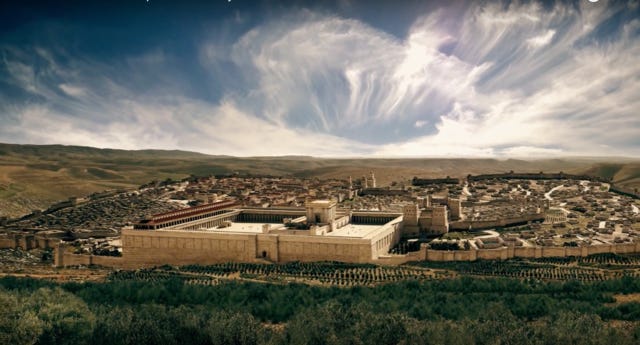The Temple of the Lord

From a distance, it must have been an awe-inspiring sight. There, sitting atop a mountain was a magnificent work of architectural art. Jutting up above the walls and drawing the eye to itself sat the Temple in Jerusalem. On a mountain peak outside the city looking in, one could see this marvelous structure, buzzing with human activity, and, if the wind was just right, one could smell the aromas of meat grilling on the altar. The beauty of the Temple told the onlookers and worshipers that this was the place where one came to meet the God of Israel and to be a part of his people. This is where one went to meet God and sit and have a communion meal with him, finding life.
During Jesus’ day, the Temple had become an architectural deception. Though everything about it screamed “LIFE,” it had become nothing more than an elaborate tomb, filled with rotting flesh and the stench of death. There was nothing there to satisfy the soul. This happened over the years of neglect and rebellion. Certainly, no one intended for it to turn out this way in the beginning. It probably started slowly and crept like a slow-moving cancer through the years until the time when Jesus came and gave the diagnosis and pronounced it dead (Lk 19.45-48).
Through the years the Temple God gave his people to signify his pleasure and presence with them had become a refuge for the abominable; it had become a den of robbers. As had happened in the days of Jeremiah, so it was happening again: God’s people were believing that the outward trappings of the Temple were enough to protect them from God’s wrath even though they worshiped false gods and impenitently engaged in all sorts of sinful practices. They could live any way they wanted, they thought, because they had–and they were–“the Temple of YHWH” (Jer 7.1-15).
As in Jeremiah’s day, a prophet comes to tell them that the Temple was not given to them to protect them in their sin. They had been given this gift of the Temple so that they might learn who they were to become as God’s people and be delivered from their sin. They were to be beautiful and filled with life like the God they imaged and whose house dwelt among them. Their abominations were corrupting the house of Israel, the Temple. Because of this, just as Yahweh did with the Tabernacle at Shiloh and the Temple in the sixth century B.C. under Nebuchadnezzar, so he will do again: it is cursed and will be destroyed. Outward beauty isn’t enough.
The church of Jesus Christ, the Temple of God, must continue to learn the lesson that God has taught us over and over again throughout history. In our baptism, each of us has put on Christ (Gal 3.27). We bear the beautiful Triune name of God (Mt 28.19). We are marked for the world to see the beauty of our God. We are the Temple of God (1Pt 2.1ff.). But having the outward appearances with no corresponding life puts us in a dangerous position; a position to be cursed. It is not enough to have been baptized or participate in the Lord’s Table regularly. It is not sufficient to be labeled a “Christian church.” All of those things, though very real, can be mere facades that cover up the fact that we are filled with death.
Our name “Christian” makes a promise to the world; a promise that says, “This person loves Jesus and lives in a way in which he is being more and more conformed to the image of God. He is fighting and forsaking his sin. He is seeking to serve his Christian family and the world in love. If you go to him, you will find the way to life in Christ Jesus.” That’s what our name says. But what happens if we are all appearance–name–but no life–no Christian actions? What if we use our Christian name as a cloak for our sin, saying, “Well, I know I live completely contrary to my profession as a Christian, but I’m okay because I’m a member of a Christian church”? God will do to us as individuals or a local church what he did with Israel: he will destroy us.
Our name is a vocation, a calling, to live as images of the one whose name we bear. When that ceases to be the case, God will not tolerate his name being taken in vain. Let us then be careful how we bear it.
The post The Temple of the Lord appeared first on Kuyperian Commentary.

